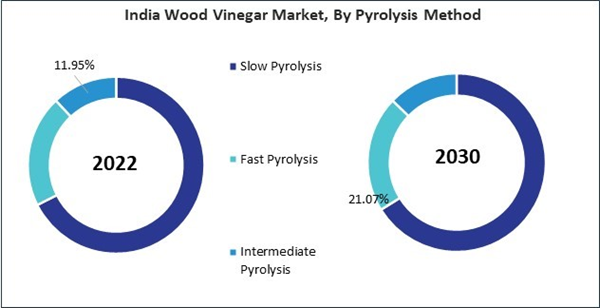By incorporating wood vinegar into their agricultural practices, farmers can optimize crop productivity, improve soil health, and promote sustainable farming methods that prioritize environmental stewardship. Additionally, the versatility of wood vinegar allows for its integration into various agricultural systems, including organic farming, hydroponics, and greenhouse cultivation, catering to diverse farming needs and contributing to the overall sustainability and resilience of agricultural ecosystems. Therefore, the India market utilized 93.48 tonnes of wood vinegar in agriculture in 2022.
The China market dominated the Asia Pacific Wood Vinegar Market by Country in 2022 and would continue to be a dominant market till 2030; thereby, achieving a market value of $1,788.5 Thousands by 2030. The India market is registering a CAGR of 6.5% during (2023 - 2030). Additionally, The Thailand market would showcase a CAGR of 6.9% during (2023 - 2030).
One of the most exciting research areas surrounding wood vinegar is its potential for promoting wound healing. Studies have shown that wood vinegar exhibits antimicrobial, anti-inflammatory, and tissue-regenerative properties, making it a promising candidate for wound dressings, ointments, and topical formulations. By inhibiting microbial growth, reducing inflammation, and accelerating tissue repair, wood vinegar-based wound care products may offer novel solutions for enhancing the healing process and improving outcomes in various types of wounds, including burns, cuts, and ulcers.
Moreover, advances in pyrolysis technology and process optimization are improving the efficiency and scalability of wood vinegar production. Automated systems, integrated biomass conversion plants, and novel distillation techniques reduce production costs and enhance product quality and consistency. Automated systems utilize sophisticated control algorithms and sensors to monitor and adjust key real-time parameters such as temperature, pressure, and feedstock composition, ensuring optimal process conditions and product quality. Automated systems reduce labor costs, improve production yields, and enhance overall operational efficiency by minimizing human intervention and maximizing process efficiency.
There is a growing demand for organic products in India, driven by increasing health consciousness and concerns about chemical residues in food. Consumers are willing to pay premium prices for organic produce perceived as healthier and environmentally friendly. As a natural and organic soil conditioner and plant growth enhancer, wood vinegar appeals to organic farmers and consumers seeking chemical-free alternatives. Therefore, the rising organic farming initiatives and practices in the Asia Pacific will drive the growth of the regional wood vinegar market.
Based on Pyrolysis Method, the market is segmented into Slow Pyrolysis, Fast Pyrolysis, and Intermediate Pyrolysis. Based on Application, the market is segmented into Agriculture, Animal Feed, Food, Medicinal & Consumer Products, and Others. Based on countries, the market is segmented into China, Japan, India, South Korea, Australia, Thailand, and Rest of Asia Pacific.
List of Key Companies Profiled
- VerdiLife Inc.
- Sane Shell Carbon Pvt. Ltd.
- Ace (Singapore) Pte Ltd.
- Nettenergy BV
- TAGROW CO., LTD.
- Applied Gaia Corporation
- Penta Manufacturing Company, LLC
- Byron Biochar
- Taiko Pharmaceutical Co., Ltd.
- Doi Shoten Co., Ltd.
Market Report Segmentation
By Pyrolysis Method (Volume, Tonnes, USD Million, 2019-2030)- Slow Pyrolysis
- Fast Pyrolysis
- Intermediate Pyrolysis
- Agriculture
- Animal Feed
- Food, Medicinal & Consumer Products
- Others
- China
- Japan
- India
- South Korea
- Australia
- Thailand
- Rest of Asia Pacific
Table of Contents
Companies Mentioned
- VerdiLife Inc.
- Sane Shell Carbon Pvt. Ltd.
- Ace (Singapore) Pte Ltd.
- Nettenergy BV
- TAGROW CO., LTD.
- Applied Gaia Corporation
- Penta Manufacturing Company, LLC
- Byron Biochar
- Taiko Pharmaceutical Co., Ltd.
- Doi Shoten Co., Ltd.









